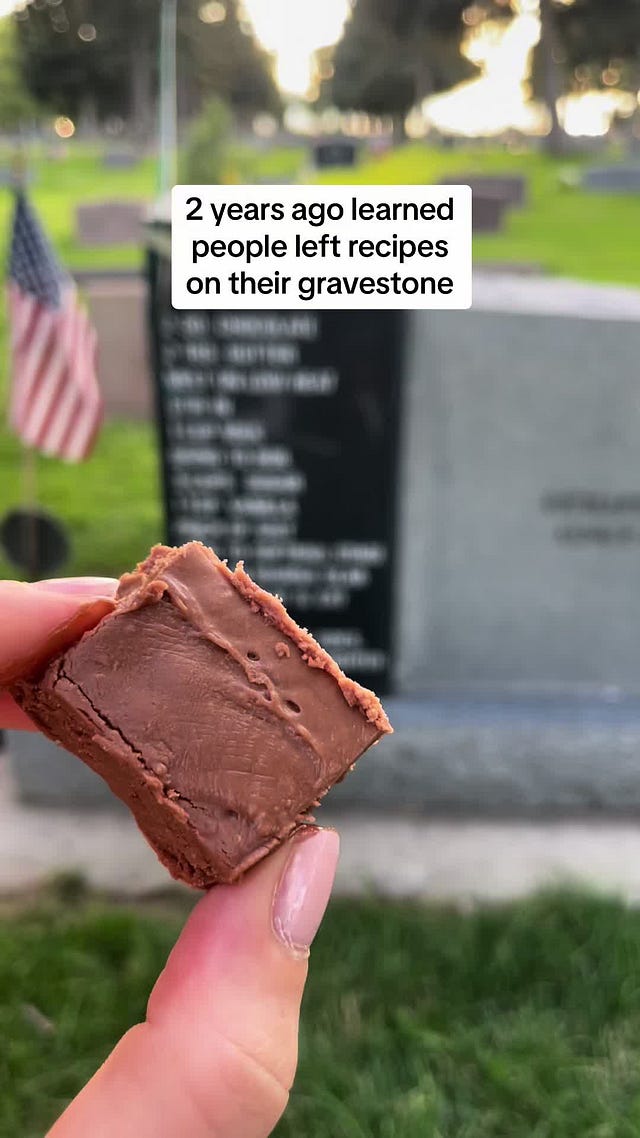Did any of you food media pros get a gift bag from “The Bear”? I don’t want more stuff so I didn’t give the PR team my address but I do want to know what was in it!
Also … I didn't expect so many responses to the last leg, I'll admit it. But this one seems like a true challenge. Are there good restaurants on this route? (The next one's gonna be way too easy. You can probably guess it.) In the meantime, enjoy the below story by Mary Fawzy. -Katherine

The sinister story behind Egypt's ubiquitous dessert, Om Ali
By Mary Fawzy
Om Ali, the Egyptian bread pudding-ish dessert, can be found at almost any corner cafe or restaurant in Egypt (and beyond in other North African and Middle Eastern countries). Its popularity stems from how satisfying and rich the pudding is, plus it’s wildly easy to make, requiring just a handful of ingredients that likely are already in most Egyptian kitchens. It’s a favorite during Ramadan, Eid, and other special occasions. It's also a dessert that comes with a sinister and mysterious story.
While everyone has their own version of the events that led to this dessert’s creation (there’s no contemporaneous documentation), it always involves murder, betrayal, and a rise to power. The most common story told is this one, featuring Shajarat al-Durr, the Sultana, the first and only woman to sit on the throne in modern Egyptian history.
She rose to power to lead Egypt during some of the most dangerous invasions in Egyptian history. Remarkably, she went from being captured as a slave and gifted to the prince as his concubine to becoming his wife, against all customs. (This was during the 12th-century Mamluk dynasty, predating the Ottoman Empire.) He gave her the name Shajarat al-Durr, which means Tree of Pearls. He became sultan and, when he died, it is said that she covered up his passing, as it occurred at an inopportune time: an attack by the French King Louis IX and his crusaders was imminent.
Shajarat al-Durr knew that news of the sultan’s death would demoralize the army, especially as they had lost some port cities to the Crusades already. For three months, she pretended to be announcing his orders, forging his signature as needed and managing to repel the French army, capturing King Louis. When the truth emerged, she gained support among the military, who believed Shajarat al-Durr should assume the position of sultana. She then negotiated a peace treaty and the ransom of King Louis with the French, enriching the kingdom and further galvanizing support for herself as the ruler.
Unfortunately, not everyone was willing to acknowledge a woman king, and her reign was threatened by the caliph of Baghdad. To prevent further conflict, Shajarat al-Durr took a husband, Izz al-Din Aybak, with the condition of marriage being that he act as figurehead of the Sultanate of Egypt while she remained the true authority behind it. Aybak grew frustrated over time and planned a strategic second marriage to enhance his political power, but he was found dead. While there is no evidence of this, the rumors were that Shajarat al-Durr organized his assassination. The nobility forced her to abdicate, leaving Aybak’s son from his first marriage, Al-Mansur Ali, the heir to the throne. Ali immediately handed Shajarat over to his mother, who was able to sentence Shajarat to death. Ali’s mother then ordered the staff to make a celebratory dish to celebrate Shajarat al-Durr’s death, leading to the creation of Om Ali, which means “Ali’s mother.”
While the life stories of Shajarat al-Durr are often debated, the theories of the Om Ali dessert’s origins are even more so: some believe that Om Ali herself murdered Shajarat al-Durr, or that Shajarat al Durr actually killed Ali’s mother and named the dish as an ironic homage. Whoever was murdered and how, it’s remarkable that this dessert of puff pastry, milk, cream, and nuts is steeped in so much myth and intrigue.
Former Smart Mouth producer Michelle Lanz showed me this fantastic TikTok account: Rosie Grant finds recipes engraved on tombstones, makes the recipes, and sometimes eats them at the graves. It’s beautiful.

 Tiktok failed to load.
Tiktok failed to load.Enable 3rd party cookies or use another browser
Industrial Meat and Coca-Cola with Jamie Loftus
Did you know you can sue objects? Coca-Cola does.
Listen to Smart Mouth: iTunes • Google Podcasts • Stitcher • Spotify • RadioPublic • TuneIn • Libsyn • Amazon Music
If you liked the newsletter today, please forward it to someone who’d enjoy it, and tap the heart icon above or below, which will help me reach more readers. I appreciate your help, y’all!
This newsletter is edited by Katherine Spiers, host of the podcast Smart Mouth.
A TableCakes Production.






